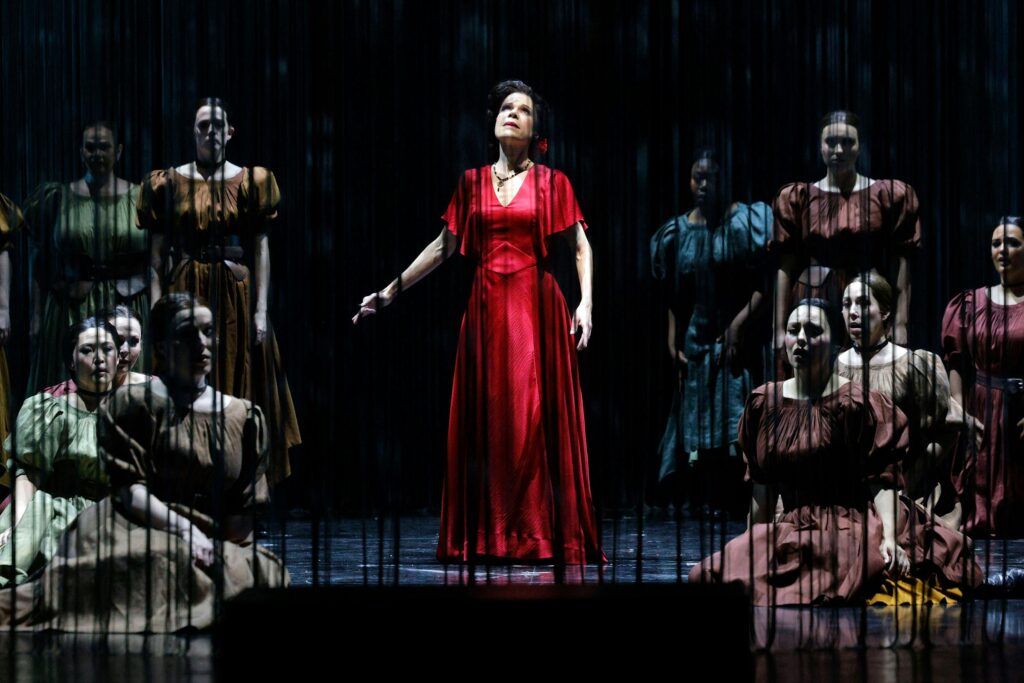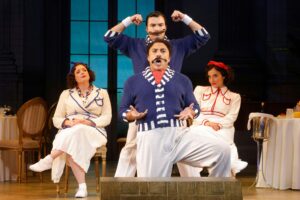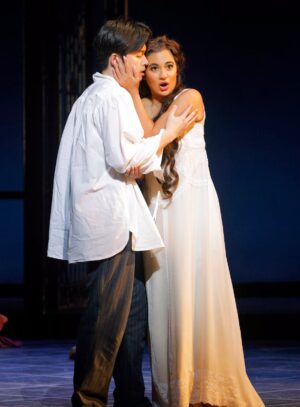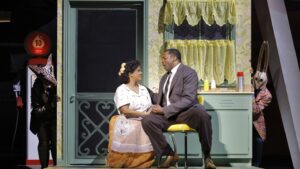The life of Federico Garcia Lorca, poet, playwright, and martyr could easily be the subject of a conventional biographical opera. But, with AINADAMAR, composer Osvaldo Golijov and librettist David Henry Hwang strive for something more indirect and poetic. Lorca, in fact, becomes a secondary character in the opera, but, somehow, even more resonant in his demotion.
Our entree to Lorca is Margarita Xirgu, his favorite actress and muse. Touring outside of Spain in the frantic and confusing days at the beginning of the Spanish Civil War when Lorca was rounded up and executed, she was unable to return. Xirgu spent the rest of her life in South America where she kept the works of Lorca alive though productions of the plays she’d done with him, and the posthumous production of his final play, THE HOUSE OF BERNARDA ALBA.
Near the start of the opera, Xirgu has just completed her farewell performance of Lorca’s MARIANNA PINEDA, his first successful play and the start of their artistic collaboration. Speaking of Lorca and the 40 years she’s played the role with her student, Nuria, sends Xirgu into a stream of consciousness series of memories which carry us through the 80 mesmerizing minutes of the opera.
As the first woman to create and direct a Cirque du Soleil show and acting as movement director for the 2016 Olympics Opening Ceremony in her home country of Brazil, Director/Choreographer Deborah Colker has experience with large-scale productions. This makes her an exceptional choice to marshal the forces of her constantly moving cast through the striking set pieces in Jon Bausor’s vividly imagined dreamscape of a set. Video projections can easily be overused, but Tal Rosner’s restrained video design is effective and well-integrated into the production.
Golijov’s eclectic score effortlessly and confidently traverses multiple musical genres. Among them, a healthy amount of flamenco stylings along with soaring arias for Xirgu and Lorca. The score also includes sound effects, recorded speech, of course, the gun shots during Lorca’s execution. Though, perhaps, the silence after those shots is even more emotionally gripping.
The singing is exceptional. Daniela Mack’s Lorca is a compelling presence with a rich and robust mezzo voice. Yes, Lorca is a modern “pants” role in the opera and, somehow, I think this androgynous choice would have intrigued the actual Lorca. Much of the role lies very low, but Mack navigates this with ease and sings throughout with a haunting beauty.
Ana Maria Martinez is a memorable Margarita Xirgu, singing with vibrant intensity as she peels back the layers of her character leading us through her past and on to the moment when she joins Lorca. She subtly delineates the character’s age at any given moment, which brings a welcome clarity to such a fragmented piece. Her final moments are truly heartbreaking and otherworldly.
Vanessa Becerra is a lovely Nuria, bringing a lighter soprano that contrasts well with the other ladies. Alfredo Tejada is a terrifying Raul Ruiz Alonso, the Falangist leader who caught and executed Lorca. His evil slowly grows from unsettling growls and cries until it totally permeates the opera through the tense execution scene.
Conductor Lina Gonzalea-Granados certainly had her work cut out for her with a score featuring so many abrupt stylistic shifts. There were moments of musical fuzziness, but, in all, the orchestra acquitted itself well.
This is truly an unmissable production of a fascinating work.
Dorothy Chandler Pavilion April 26 – May 18 laopera.org






